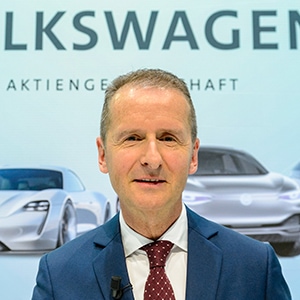
Herbert Diess |
Volkswagen Group has a new driver at the wheel. In April, the Wolfsburg-based company named Herbert Diess, head of the flagship VW brand, as CEO. Diess will leadinformation technology, group development and research across the organization, while overseeing strategy as the group moves toward self-driving cars and electric vehicles. He arrives as the manufacturer plans to restructure its businesses into six new divisions, with its car brands falling into three new groups (Value, Premium and Super Premium, together with a special unit for Bentley), plus the truck and bus segment, and a separate unit dedicated to the Chinese market.
Diess, 59, has been described by colleagues as “ambitious and power-hungry.” He began his career at global parts supplier Bosch before landing at BMW in 1996. Joining VW just before the crisis of US emissions-tests rigging broke out, Diess was able to keep the company profitable despite some $30 billion in fines, settlements and vehicle refit costs piling up. “He is clearly very competent, and he has been at VW for a while now, so if he has managed to survive so far in the corporate culture, he must be the right fit,” says Paul Nieuwenhuis, co-director of the Centre for Automotive Industry Research at Cardiff Business School, in Wales. “He is perhaps more visionary than his predecessors, but that is exactly what is needed now.”
Whether Diess can maintain the group’s status as world’s largest carmaker will largely depend on whether he manages to associate Volkswagen with cleaner cars. “Like all global manufacturers, VW is trying to transition to a more electrified fleet while at the same time continuing to improve the emissions and fuel economy of their current fleet,” argues Bruce M. Belzowski, managing director at University of Michigan Transportation Research Institute’s Automotive Futures. “It is a difficult balancing act because the current fleet is profitable, and the electrification projects are not.”
Another challenge, says Belzowski, might come from autonomous taxis and car-sharing services: “So far, taxis have always been a source of sales, but car-sharing has the potential to reduce sales if buyers decide that it is easier and more cost effective.” Down the road, adds Belzowski, the threat from niche and future-forward brands such as Tesla might grow: “No manufacturer has ever had hundreds of thousands of people pay $1,000 in advance to purchase a vehicle that is not even in production, so the established industry has taken notice.”



